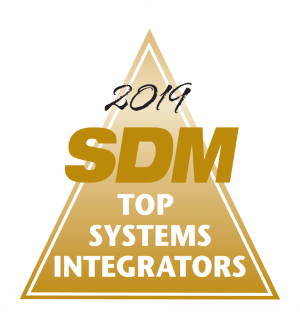Integrators and manufacturers who execute security projects in sporting venues have an award for the work they do — the Golden Eagle Award. The award, sponsored by SDM, is from the National Center for Spectator Sports Safety and Security (NCS4).
The University of Southern Mississippi is home to the National Center for Spectator Sports Safety and Security and the Golden Eagles. This award recognizes excellence in the safety and security aspects of sports venues by their designers, builders and integrators. The award will honor the best project among all nominees each year. The naming of the Golden Eagle Award also recognizes the commitment and work that the University of Southern Mississippi does in contributing to safety and security in the global spectator sports industry.
The security projects from the six finalists are presented on these pages. Their case studies will be presented to attendees of the 2017 National Sports Safety and Security Conference & Exhibition, during a session on July 12, 2017, to be held in Orlando, Fla. The audience then will select one of them as the fifth annual Golden Eagle Award winner. See “More Online” on page 68 to learn how the winner is revealed.
NCS4 Golden Eagle Award Nominee – Arecont Vision
Sports venue: Fort Washington Golf and Country Club, Fresno, Calif.
The Fort Washington Golf and Country Club in Fresno, Calif., features a competitive 18-hole golf course with lush fairways and perfectly manicured greens, and 5-star dining and banquet facilities. The analog surveillance system The Fort had in place consisted of two analog cameras to cover the club’s main parking lot and a third analog camera on a pan/tilt mechanism to view the driving range.
“The previously installed cameras were very poor quality, so when an incident occurred we could not really see what happened,” said Alan Ehnes, Fort Washington’s director of golf.
The Fort’s management and board of directors decided to upgrade to a higher-quality IP surveillance system, deciding on the use of megapixel cameras. The management team collaborated on the design of the system with Matson Alarm Company, also located in Fresno. The system comprises one Arecont Vision MegaView AV3226PMIR 3 megapixel WDR camera; one MegaVideo Compact AV5115DNv1 5 megapixel camera with 8–80 mm lens; and three SurroundVideo AV12186DN 12 megapixel 180-degree WDR panoramic IP cameras. With these five cameras, the Fort’s personnel are able to view a much larger coverage area with significantly greater detail than with its previous system.
“There is not any analog camera that could possibly capture the detail and coverage we are able to achieve using Arecont Vision’s IP cameras,” said Ben Kiser, Matson Alarm’s IT manager.
“The losses we were experiencing certainly outweigh the cost of installing the new cameras. Besides insurance deductibles, we were having a lot of problems with break-ins where people were having wallets and other belongings stolen from their cars,” Ehnes says. “The individual who was committing the majority of those crimes was actually identified and located.”
Ehnes summed the project by saying, “I think these Arecont Vision cameras are priceless!”
FINALIST: NCS4 Golden Eagle Award Nominee – Babel Street
University of Phoenix Stadium, Glendale, Ariz.
Babel Street worked with a partner to analyze Web, dark Web, and other publicly available information (including social and consumer platforms) for brand management-related sentiment and comments, for mentions of threats toward those affiliated with the playing of the NFL’s Super Bowl XLIX, and for managing the venue during a big event — all using the Babel X technology.
Babel X, Babel Street’s premier SaaS technology, was used by both internal and partner analysts for this project. Babel X is a cloud-based solution that discovers and analyzes multi-lingual information emanating across the Web in real-time. The platform reviewed more than 40 social and consumer platforms in 200-plus languages, while also conducting entity searches when necessary.
A member of the Babel Street team, in addition to the company’s staff at headquarters, developed multiple curated searches (filters) around terminology and geolocation to assist its partners in maintaining situational awareness and security of the game facilities. Babel X was able to analyze a variety of threat terms (traditional and slang) as well as emojis and entities related to the greater Phoenix area, including various event hashtags.
As items came into the filters, they were triaged in the platform and passed along to predetermined POCs for further evaluation and decision making.
Babel Street and its partner analysts were able to collect more than one billion documents related to Super Bowl 49 and the Phoenix area, including 40,000 geo-located postings. From these, 124,000-plus were filtered for analysis, with 48 of those being passed along to the necessary individuals for further review. Ultimately, among the multiple uses of Babel X during the game, three particular postings were identified that indicated possible threats to the venue. Each was vetted successfully and cleared.
Simply put, Babel X’s ability to identify and triage the number of postings, in foreign languages with and without geolocations, in real-time is unparalleled.
NCS4 Golden Eagle Award Nominee – Vidsys
Sports venue: Super Bowl LIVE, Houston
Houston has been working over the last decade to transform its infrastructure into a smart city. Through increased transportation management and innovative public safety and situational awareness technology, the city has successfully hosted major events such as the Republican Primary Debates, the 2016 NCAA Final Four Tournament, and the 2017 Super Bowl. The city also had to deal with a number of weather events, including recent devastating floods.
The City of Houston’s Office of Public Safety launched a public safety video initiative that combines footage from cameras around the city and translates that data into actionable information for law enforcement and other public safety officials. This program was an essential part of Houston’s security efforts for Super Bowl LI.
As part of an ongoing partnership with Houston, global company Vidsys provided physical security information management (PSIM) and converged security software that pulled in data from sensors, ID management, video, access control, alarms, IT systems, social media and other IoT devices to manage risk during the event. Vidsys’ technology allowed the city to share video and other important data with security teams around the city, including first responders, public safety agencies, and other venues.
The platform collects, analyzes, verifies, resolves and tracks data from multiple, disparate subsystems using open architecture standards to help manage situational risk. Vidsys’ software works directly with special response groups to connect them with command center communications and video footage, enabling increased collaboration and allowing authorized users to view and manage situations in real-time.
To support the size of the crowds, Houston installed a significant number of new cameras that had to be quickly integrated into their system. This process was facilitated due to the flexibility of the browser-based platform and installed within a matter of days. Whereas before, Houston’s various agencies’ public safety tactics and data were siloed, Vidsys has created a single user interface where the agencies can quickly communicate and collaborate.
NCS4 Golden Eagle Award Nominee – Axis Communications
Sports venue: Wrigley Field, Chicago
Wrigley Field, home of the 2016 World Series Champion Chicago Cubs, is an iconic baseball park on Chicago’s North Side. Built in 1914, it is the second oldest ballpark in the U.S., known for its ivy-covered outfield walls. Seating 41,160, Wrigley plays host not only to a full slate of Cubs home games each season, but also to sold-out concerts by major artists.
The security challenges around Wrigley Field are large-scale and complex. Wrigley Field’s security team worked closely with Axis Communications and security systems integrator MidCo to determine the right mix of video and access control technology to meet its security objectives. One of the challenges the ballpark faces is that lighting conditions vary depending on the event type, making video surveillance challenging.
The installation of Axis cameras will be phased, with about 150 cameras expected to be installed in spring 2017. The number of cameras is likely to triple by the end of the project. These include a mix of outdoor-ready bullet cameras, fixed dome cameras, PTZ cameras, and network video door stations. The cameras include WDR and Lightfinder Technology, which help with seeing images more clearly and with greater detail in challenging light conditions. Also, Axis ZipStream technology will be utilized to help reduce video bandwidth and storage requirements.
The exacqVision video management software allows the Wrigley Field security team to monitor video data in real time from a central command center.
Axis’ surveillance technology has given the Wrigley Field security team the benefits of high-quality images, even in challenging light conditions; crowd control through coverage of the entire venue; centralized management, using the exacqVision VMS; and video data securely stored on a network server.
FINALIST: NCS4 Golden Eagle Award Nominee – V5 Systems
Sports venue: SJSU Spartan Stadium, San Jose, Calif.
Spartan Stadium is atypical for major sporting complexes. Mass areas of parking lots and ingress/egress areas had no video coverage. Historically, there had been incidents associated with the stadium and its parking lots — mainly fighting and excessive alcohol consumption.
During a Saturday evening football game in September 2016, a large group of people in the southwest corner of the stadium’s overflow parking lot became riotous; they refused to leave, made a stand, and began to throw rocks and bottles at the police officers. SJSU has a highly trained and diligent police force, but their resources were not enough that evening and eventually the local police department was called in for assistance. Other fights then broke out and eventually the crowd left through the three egress gates. In the end, SJSU did not have situational awareness of the crowd as a whole; they did not have any video of the rioters who were throwing the deadly objects or high-pixel HD video of perpetrators leaving the area.
At the time of this incident, San Jose State University was already in the process of evaluating V5 Systems’ Portable Security Units for use at the Spartan Stadium football games. Now, however, the process of determining where and when to put up these units was accelerated.
The plan was to obtain overall views (situational awareness) of the areas where crowds may gather and become unruly, then get HD, high-pixel counts of all persons and vehicles coming in and out of the access point to the parking lot.
V5 Systems’ technology provides wireless, self-powered outdoor security in less than 30 minutes without the limitations of tapping into fixed power and connectivity. Without the long process it takes for trenching, V5 devices are built to deter, prevent, mitigate loss, and capture violators rapidly. The devices are all packaged in a compact, lightweight (25 lb.) enclosure enabling customers to simply move it to where they need it.
FINALIST: NCS4 Golden Eagle Award Nominee – Avigilon
Sports venue: Hard Rock Stadium, Miami Gardens, Fla.
Hard Rock Stadium located in Miami Gardens, Fla., is home to the Miami Dolphins, University of Miami football team, Capital One Orange Bowl, Super Bowl LIV and the 100th anniversary of the NFL, international soccer and a host of world-class events.
The challenge was to provide an effective surveillance solution in a competitive bid situation that delivered the best recorded evidence with a complete overview of the 65,000-seat Hard Rock Stadium Bowl Area to effectively monitor critical assets, monitor the crowds, ensure spectator safety, confirm regulatory compliance, reduce operational costs and reduce liability costs.
Avigilon and G4S partnered to protect the Miami Dolphins’ Hard Rock Stadium, delivering state-of-the-art security technology through fewer high-resolution cameras that were able to cover larger areas, while providing exceptional image quality. In phase one, G4S installed the Avigilon Control Center (ACC) video management software, cameras with self-learning video analytics, and network video recorders.
The design achieved complete coverage of the entire 65,000 stadium seating area using 12 MP multi-sensor cameras, as well as 16 MP and 30 MP HD Pro Series cameras providing high-resolution video, by using fewer cameras, less infrastructure and less recording space.
The Avigilon solution allows Miami Dolphins’ Hard Rock Stadium staff to centrally manage video surveillance from any location, while giving administrators visibility into activity and providing enough image detail to zoom in and get a clear image of any visible individual or on a specific space within the bowl.
Used during game days as a tool to assess and validate patron complaints, the Avigilon solution has not only helped improve the spectator experience, it has also dramatically reduced human resources costs because operators can view live and recorded footage remotely from their smartphones and tablets through ACC Mobile.
MORE ONLINE
At the National Sports Safety and Security Conference & Exhibition in Orlando, the case studies of the six finalists will be presented to conference attendees on July 11, 2017. The audience then will select one of them as the fourth annual Golden Eagle Award winner, which will be announced on July 12, 2017. SDM will announce the winner on its Facebook page at www.facebook.com/SDMmagazine.










